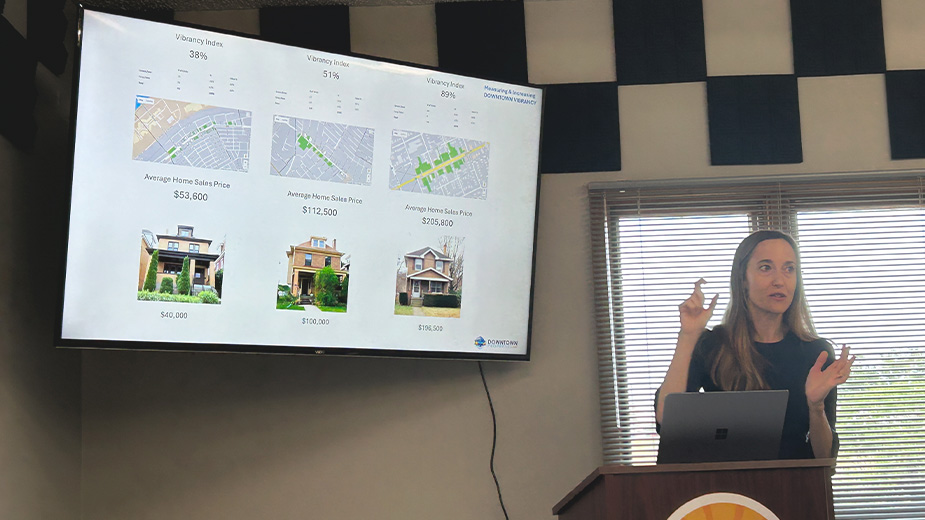Entrepreneurship 101 and More at Youngstown State
YOUNGSTOWN, Ohio — One of Rich Wetzel’s first business ideas was to create an online shopping platform similar to Groupon and LivingSocial. He took it and his business plan to Jim Cossler, CEO of the Youngstown Business Incubator.
“Jim Cossler shot me down,” he says, stifling a laugh. “It was a reality check, a learning experience. That’s when I realized that there are certain markets that are harder to penetrate than others.”
That was back when Wetzel was a freshman at Youngstown State University. Four years later, he graduated with a minor in entrepreneurship to complement his degree in international business. He now works at the YBI where he started his own 3-D printing company, Ambridge3D, and is the incubator’s additive manufacturing business coordinator.
YSU’s minor in entrepreneurship was originally developed by the Monus Entrepreneurship Center at the Williamson College of Business Administration as a certificate program to help young business owners develop their companies. When the program was expanded into a minor, Wetzel moved up with it.
“The best thing was how to identify problems in a market and see where there are opportunities for startups,” Wetzel says of the program. “You can enter the program with an idea and by the end have a fully structured business plan that you can present to a bank, ready for investment.”
So how do you teach students how to be entrepreneurs?
“It’s a lot about creativity and innovation and recognizing opportunity,” relates program director Donna Walsh. “Some people just understand how all the pieces fit together while others, not so much.”
The core of the program lies in three classes: “Exploring Business,” “New Venture Creation” and “Small Business Financial Management.” Those who minor in the program must also choose two electives.
The first class is essentially Entrepreneurship 101 that introduces the basics while New Venture Creation begins to delve into what it takes to be an entrepreneur. The final course focuses on “handling money, finding money and setting up all the account systems,” Walsh says.
Students must also put together a business plan for their capstone project, which they work on as they take all of the other courses. While all students who go through the program are interested in business, their reasons differ, Walsh says.
“Some already own businesses and want to work on the nuts and bolts,” she says. “Others want to think more like an entrepreneur. So, while they never start their own business, being able to do that is always a good thing.”
What the program helps students do the most, says Betty Jo Licata, dean of the Williamson College, is reduce the risks the students have to take when they begin their businesses.
“What this program can do is take some of the risk out of it because you’ll know what to do. These students know what steps they need to take. They have a framework and they know what their market is. It takes out some of the risk. Not the financial risk, of course, but if you know what you need to do, you’re better positioned to respond.”
The majors of students in the program come from all across campus. Some entrepreneurship classes fill a requirement to earn a major in dance management in the College of Creative Arts and Communication as well as some degrees in music. But even without requirements, there’s a healthy mix of majors.
“In those areas, they’re often entrepreneurs because they have to freelance or start their own business. With dancers, musicians, artists, journalists, psychologists, that’s what they face,” Walsh says. “Not everyone’s going to give them a job, they sometimes have to make their own.”
The accessibility of the program, Licata adds, also leads to students getting more involved in their classes while working toward the minor or a certificate.
“Because it can be paired with any major on campus, students can take their interests and layer these classes on top of it,” the dean says. “It allows them to position themselves to start their own business, work for a venture or be entrepreneurial within an existing business.”
There’s also an entrepreneurship internship available through the program, putting students in local businesses or at the YBI.
“Seeing the challenges they may face, the emergency situations, the long nights and the sacrifices you need to make can be tremendously valuable to interns,” Walsh says. “You couldn’t possibly teach all of that in a classroom setting, but internships are stellar for that.”
Before working at the YBI, Wetzel was an intern. YSU student Gianni Centofanti is currently an intern at the incubator as an entrepreneurship research coordinator. Going through the internship has helped her better understand the world of startups, she says.
“Being here has put everything in perspective for me,” Centofanti says. “It’s not just about getting an A, but this is someone’s actual money they’ve invested. It’s eye-opening to see what real businesses and startups are doing.”
Centofanti’s original business plan was to create a website where visitors could buy as few as one personalized greeting card. They could customize each with personal pictures and messages. What sets hers apart is many other sites require bulk purchases, she says.
“While I’m not doing the card business, it helped me focus more on what my passions are,” she says. “I’m not sure where it will take me, but I know that I want to get into business and that I want it to be a social enterprise, where there’s a greater purpose beyond just the profits.”
Social enterprise is a common thread among students in the entrepreneurship program, Licata notes. Almost equally as common are students whose parents (and sometimes their grandparents) have a family business. Many are looking to learn more about business, she says, than what they can pick up by working in the family store.
“With family-owned businesses, the challenge is the third generation. To remain competitive, they have to continue to grow,” Licata says. “While many students want to be entrepreneurs, there are those who want to be ‘intrapreneurs,’ who want to do similar things in an existing organization.”
One is Adam Aebischer, who grew up working in his family’s shop, Aebischer’s Jewelry, in Poland. Since completing the program, he’s helped bring out new product lines, including the Swiss-made Oris Watches – and expand relationships with existing brands such as Naledi.
“You have to offer the public something new and something different,” he says. “As soon as we started talking about how to differentiate ourselves [in class], I came back here and told my dad, ‘We have to start making sure we carry different products to separate us from the competition.’ ”
Because of an exclusivity contract, the Oris brand isn’t found elsewhere within 50 miles, Aebischer says, and Naledi has promised to keep Aebischer’s as its sole dealer in the region.
The lessons the three students have gained through YSU’s entrepreneurship program, both inside and outside the classroom, have proven invaluable so far.
“It’s investing in your own capital. … Even if someone is already involved in business, going through the program can help people get a better understanding of what’s needed,” Aebischer says.
For Centofanti, an important factor was the gathering of students with different majors and all with different ideas.
“Even without starting the business you made in the classes, getting the inspiration from the program is the biggest reason I’d recommend it,” she says.
And interest in the program seems to be growing. At one of the college’s Welcome Week sessions, Walsh asked the freshman how many wanted to be entrepreneurs. About half in the Williamson Hall atrium stood up, she reports.
“It’s a hot course of study right now,” Walsh says. “The demand for entrepreneurship education is clearly increasing.”
Pictured: Adam Aebischer brought new products lines to his family’s store, Aebischer’s Jewelry, after finishing the program at YSU.
Copyright 2024 The Business Journal, Youngstown, Ohio.



